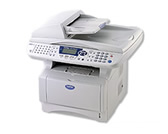MFC-8820D
FAQs & Troubleshooting |
I am experiencing problems sending a fax, what can I do?
If you are experiencing problems sending faxes, please follow the instructions below:
-
Verify that the date and time are displayed on the LCD.
-
If the LCD displays the date and time, continue to Step 2.
-
If the LCD displays an error message, check "FAQ & Troubleshooting" for further information on that error.
-
If the LCD shows Telephone, any key pressed will not respond. Please hang up the extension phone and/or press the Hook, Hook/Hold, Speaker Phone or Tel/R key.
-
If the LCD is blank, first verify that the unit is not in the OFF mode. Turn on the power switch on the side of the machine and see the date and time appear on the display. If the display remains blank, verify that the power cord is connected. If the power cord is connected to a surge protector or power switch, remove the cord from the device and connect it directly to the outlet. If date and time now appear, there is a problem with your surge protector or power switch. If the display is still blank, try a different electrical outlet. If the display still remains blank, your machine may require service.
-
If the LCD displays the date and time, continue to Step 2.
-
Verify if your Brother machine has a dial tone. For more information, please refer to "How can I verify if my Brother machine has a dial tone?".
-
If there is dial tone, continue to STEP 4.
-
If there is no dial tone, verify the telephone line cord is connected from the jack (socket) on the Brother machine (labeled LINE for USA) directly to the WALL jack (socket). If there are splitters, commshare devices, power strips or surge protectors between the WALL jack (socket) and the Brother machine, please remove them. We do not recommend having these devices connected between the WALL jack (socket) and Brother machine. The machine should be connected directly into the WALL jack (socket).
If the line connection does not require any changes, continue to STEP 3.
If the line connection required a correction, connect the line cord correctly and then try to listen for a dial tone.
If there is a dial tone, continue to STEP 4. If there is still no dial tone, continue to STEP 3.
-
If there is dial tone, continue to STEP 4.
-
Remove the telephone line cord from the WALL jack (socket) and connect a known working extension telephone with a known working telephone line cord to the same WALL jack (socket). Lilt the handset of the telephone and listen for a dial tone.
-
If the telephone does not have dial tone, the issue is related to the phone tine or WALL jack (socket). Contact the local telephone company for assistance.
- If the telephone has a dial tone, disconnect the telephone line cord from the telephone and connect it to the jack (socket) on the Brother machine (labeled LINE for USA). Then check if your Brother machine has a dial tone. If there is a dial tone continue to STEP 4. If you do not hear a dial tone and your machine may require service.
-
If the telephone does not have dial tone, the issue is related to the phone tine or WALL jack (socket). Contact the local telephone company for assistance.
-
Verify that your document(s) are the correct size. The document(s) must be between 5.8 inches (148 mm) and 8.5 inches (216 mm) wide and 5.8 inches (148 mm) and 14 inches (356 mm) long.
If you must send a document longer than 14 inches (356 mm) long, click here to obtain contact information for the appropriate Brother Customer Service Center for assistance.
-
Verify that you have inserted the document(s) face up into the ADF with the top edge first.
- When placing the document(s) in the Automatic Document Feeder (ADF), verify that the Fax mode key is illuminated in green and the LCD changes to Fax Res: [the desired resolution setting] and Dial & Start or Enter Fax no.
-
Be sure to adjust the paper guides on the sides of the ADF to fit the width of your document. This insures the document will feed straight and will prevent jams.
-
Verify that you are not inserting more documents than the ADF can hold. The ADF can hold up to 50 pages of standard 20lb (75 g/m2) paper, feeding each one individually through the fax machine. If you are using paper heavier than 20lb (75 g/m2), you must feed each sheet individually to prevent jams.
DO NOT use curled, wrinkled, folded or ripped paper, or paper with staples, paper clips, paste or tape attached. DO NOT use cardboard, newspaper or fabric.
-
If you are sending faxes Manually, be sure to wait to hear the fax tones of the receiving fax unit before pressing the Start key.
-
If you are having problems sending a fax to one number, verify that the number you are dialing is a working fax number and that you hear fax tones when the receiving machine answers.
If you continue to have problems sending faxes after following the steps listed above, your unit may require service.
